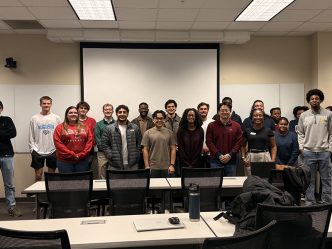Policymakers, military leaders and government officials agree that the development and sophistication of artificial intelligence programs are critical for international security.
Lance Hunter, PhD, professor of political science in the Department of Social Sciences in Augusta University’s Katherine Reese Pamplin College of Arts, Humanities, and Social Sciences, recently published an article, “Artificial Intelligence, Data Centers, Energy Capabilities, and International Security: An Exploratory Analysis,” in the journal Armed Forces and Society to assess how countries’ infrastructures affect the level and sophistication of AI development regarding security.

Hunter explains that the level and sophistication of AI are often dependent on the nature of data centers, and data centers are dependent on large stores of energy, in many cases, electricity. If a country wants to compete in AI development, a large energy supply is often needed to power data centers to provide the necessary computing power to develop and operate sophisticated AI programs.
Hunter said data centers currently use an estimated 1% to 2% of power worldwide, and those energy demands could grow 160% by 2030.
“Countries with the necessary data centers and energy production capabilities to develop and run sophisticated AI programs will have a distinct advantage in the AI race. There’s a lot of discussion regarding whether China or the United States are ahead in AI development because of the security ramifications of who’s leading,” Hunter said. “This paper attempts to examine the infrastructure countries have in place that can support sophisticated AI development regarding security and see where countries rank.”
In the paper, he developed four indices that capture the nature of countries’ data centers, energy production capabilities, energy efficiency and additional economic, technological, military and cyber factors that can affect AI development regarding security.
“I found that the United States is currently ahead globally in terms of having the infrastructure in place to develop sophisticated AI regarding security. China is a very close second, and Russia is a distant third with numerous countries closely trailing, such as the United Kingdom, France, Australia, Canada and Germany,” Hunter said. “One of the things I found is that China has a moderate advantage over the United States regarding energy production and a slight advantage regarding energy efficiency. However, the U.S. has an advantage regarding its data centers and the sophistication of technology surrounding AI that can enhance AI development regarding security.”
“There’s a lot of discussion regarding whether China or the United States are ahead in AI development because of the security ramifications of who’s leading.”
Lance Hunter, PhD
Another important part of the discussion, according to Hunter, is the recent release of DeepSeek, the Chinese large language model that led to conversations about where the U.S. stands in comparison with China regarding the AI race and how DeepSeek affects the infrastructure required to develop sophisticated AI programs.
He felt there was a bit of an overreaction to its breakthrough regarding its alleged effect on the amount of computing power and energy production capabilities required to develop and operate AI programs.
“While the DeepSeek breakthrough illustrates that start-up companies can take existing AI technologies, such as ChatGPT, and build off them more efficiently, countries and companies that seek to lead in AI development still require large amounts of computing power and energy,” Hunter said.
For example, Hunter said immediately after the DeekSeek breakthrough, many of the large U.S. technology companies including Meta, Alphabet and Microsoft issued guidance for their upcoming research and development spending. Each company stated it planned to significantly increase spending on the large infrastructure (data centers, computing power and energy capabilities) required to develop and operate sophisticated AI programs.
“While some startup companies such as DeepSeek can utilize existing AI technology in a cost-efficient manner, the spending priorities of major U.S. tech companies indicate that large-scale data centers, significant computing power, and substantial, efficient energy production capabilities remain critical to leading in AI development,” Hunter said.
 Augusta University
Augusta University




